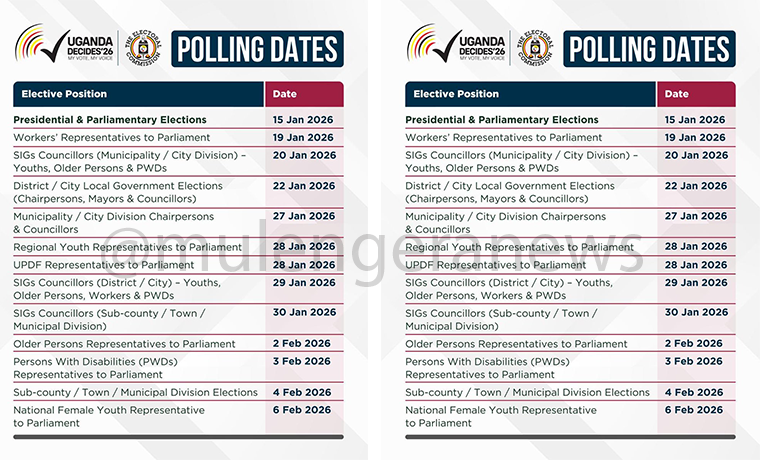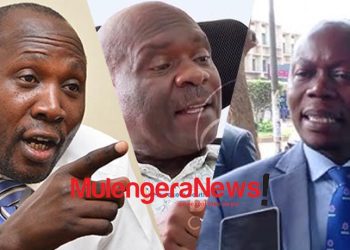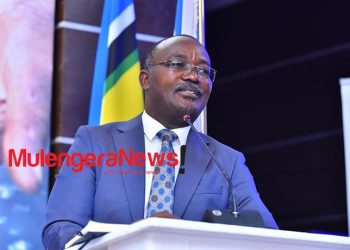By Otim Nape
A potentially very explosive situation is brewing that could lead to severe disagreements and clashes between officials in the UN refugee office in Uganda (UNHCR) and their superiors in Geneva. Why? We have exclusively received a confidential document that served as UN High Commissioner for refugees Filippo Grandi’s talking notes in the various stakeholders meetings he addressed while in Uganda last January. The big man who was in Uganda at the peak of allegations that there was a syndicate of officials in the OPM working others in the UN system to create ghost refugees and subsequently steal money in billions. During his stay in Uganda, Grandi held meetings with many stakeholders including Prime Minister Ruhakana Rugunda with whom he concurred on the need to comprehensively investigate the allegations and severely punish culprits in case anyone is established to have been complicit. Specifically during the 31st January 2018 confidential meeting at Kololo Hill residence of the Italian Ambassador Domenico Fornara, Grandi read out guidelines that would be followed during the refugee verification exercise.
The meeting was actually preceded by a working lunch Grandi had with a few western ambassadors/diplomats representing countries and agencies that significantly fund refugee operations in Uganda. The idea was to persuade them to support the UN Country Coordinator Rosa Malango’s call onto the GoU to have a comprehensive probe into the alleged inflation of the refugee figures with the intention of defrauding the UN and other donor agencies. According to diplomatic sources at the meeting, Grandi’s presentation that afternoon was titled: “Sharing on UNHCR’s commitment to transparency and accountability while seeking continuous support for the Comprehensive Refugee Response Framework (CRRF).” Naturally the meeting was also attended by representatives from the UNHCR Ugandan office to whom Grandi clarified and emphasized the dos and don’ts of the verification exercise that he had agreed upon with Rugunda. After saluting the GoU for gradually improving the quality of refugee management over the years, Grandi turned to his own staff and emphasized as follows: “Registration is a task for the government and we should not seek to take it away, undermine it nor condescend to produce a parallel registration system. Case management for purposes of protection and assistance work is another issue and ambassadors can help by promoting the very regular access to data or full inter-operibility with UNHCR’s (ProGres) system.” He acknowledged that trust levels between UNHCR and the GoU were low and implored his officers to tread carefully during the refugee verification exercise lest things escalate and thereby complicating the relationship between the GoU and the relevant UN agencies. “Rather it [verification exercise] should be to assure the Government that we are there to support the improvement of their system and not undermining it.” He clearly stated that the UNHCR and WFP should use the verification exercise to “take head count and plot audit with the OPM to ascertain the number of people residing in the settlements.”
 THINGS FALL APART:
THINGS FALL APART:
However, on commencing verification, as agreed upon between Rugunda and their boss Filippo Grandi, the UNHCR officials distorted the exercise in many ways and thereby making the GoU nervous. First of all they went out to do the work without adequately involving the OPM which is mandated to represent the GoU. In what intelligence considers a direct attack on Uganda’s sovereignty, UNHCR has also emailed the OPM officials demanding for data on refugee cases that were closed, those on hold and those that are inactive. One wonders what these new demands have to do with the refugee population verification that was aimed at establishing the extent to which GoU/OPM had exaggerated refugee numbers as alleged by UN Country Coordinator Rosa Malango in her 26th January letter to the OPM.
Besides resorting to dismantling/suspending the GoU registration system and replacing it with theirs for example at Oruchinga refugee settlement, the UNHCR has been registering new born babies and new arrivals under the cover of the verification exercise and thereby making the GoU more nervous. The undercover security agents deployed countrywide to spy on the verification exercise by UNHCR are nervously wondering why UNHCR teams are proceeding to add them (new born babies and new arrivals) onto the register without seeking consent of the GoU. In another outrageous diversion from Filippo Grandi’s original instructions, as agreed upon with Rugunda, the UNHCR verification teams are also issuing attestation documents to refugees which is clear distortion and not their mandate under Rugunda’s verification directive. UNHCR has also been demanding for finger prints and refugee photographs which have nothing to do with verification. Strangely the concerned GoU political leaders namely Hillary Onek and Musa Ecweru are looking on indifferently as the UNHCR Kampala office continues carrying out verification in a manner that subverts their boss Filippo Grandi’s well stated guidelines regarding the dos and don’ts.

ANDREW HOPKINS EMAIL:
The UNHCR’s dishonesty was once again manifested in the 10th March email which its Chief of Section Andrew Hopkins sent to the OPM urgently demanding for the “latest possible data extract update from RIMS” while insisting that the GoU must routinely furnish UNHCR with this data “on a biweekly basis so that available data for the verification activity is as up to date as possible.” Hopkin’s 10/3/2018 email was channeled to the OPM through UNHCR Uganda Country Representative Bornwell Kantande, Kemlin Furley, Margaret Atieno, Jens Hesemann, David Birt and Mamadou Cissokho. It betrayed lack of good faith in the UNHCR actions.
Hopkins explained that this was necessary to enable UNHCR do better in areas like “identity management while easing pressure on the Litigation Desk and facilitating rapid data verification.” In the same email, the UNHCR Chief of Section stated that “The last RIMS data extract was very useful but we would kindly request the following additional data fields to be included along with those fields previously shared: (1) RIMS registration data, (2) photographs (meaningfully linked to the individual in RIMS), (3) existing ration card numbers, (4) inactive/closed cases and inactive/closed individuals on active cases. This process status should be indicated for each individual as active inactive or closed, (5) refugee status category (prima facie, recognized) and (6) addresses.” Hopkins added that: “Do let us know if additional clarification is required.” All this clearly shows total departure from Filippo Grandi’s initial guidelines as it borders on going into registration as opposed to mere verification as agreed between Rugunda and Grandi.
As we reported in our earlier story (titled WHY UNHCR RISKS WAR WITH M7 OVER REFUGEE REG’N EXERCISE published on March 13th), there is growing concern and intelligence services have advised the President to act swiftly and resist UNHCR plans to suspend the GoU refugee registration system and replace it with theirs immediately the verification exercise is completed at every settlement. The argument is that this will be subversive to Uganda’s sovereignty because the servers on which UNHCR intends to keep the data are in Geneva whereby GoU will have no control or even ready access anymore. For being complicit in this conspiracy against their own country, intelligence sources say, some political leaders at OPM could lose their positions in the upcoming reshuffle. In a recent crisis meeting, called on the prompting of the President, Rugunda directed that GoU agencies like NIRA, NITA, ISO, CMI and Foreign Affairs Ministry become thickly involved to ensure that UNHCR doesn’t capitalize on the thinness of OPM staff on the ground to execute something detrimental under the cover of the ongoing refugee verification exercise. This mistrust is well known and Filippo Grandi referred to the same in his Wednesday 31st January address during the Kololo meeting at the Italian Ambassador’s residence. It’s because of this that he urged his staff to be very cautious while carrying out the verification exercise lest they alarm the GoU.



THE CONTEXT; THE BIGGER PICTURE:
And lately the issue of refugees (for which President Museveni has attracted kudos from world leaders going by the enthusiasm the refugee solidarity conference at Munyonyo created last year) has become a very serious priority for Uganda as a country. The latest OPM figures show that, as of January 2018, over 1.4m refugees lived in Uganda compared to a mere 433,595 refugees we had as of February 2015. This is reflective of an increase of 225% in just 3 years. This briefly is how it has been growing; as of January 2016 it grew to 433,595; to 982,716 as of December 2016 and eventually to 1,395,145 as of December 2017. And as of January 2018, the number had exponentially grown to 1,411,794. These are mostly Somalis, Rwandese, Congolese, Ethiopians, Eritreans, Sudanese, South Sudanese and Pakistanis. All the applicable laws in Uganda (namely the Constitution Article 187 (1) 6th Schedule & the Refugee Act 2006) mandate the GoU, through the Department of Refugees in the OPM, to handle the registration and profiling of all refugees residing in Uganda. Overtime the refugee registration processes have evolved into the usage of IT applications technology known as the Refugee Information Management System (RIMS). RIMS was launched in April 2015 by Onek as a mechanism to enhance government control and ownership of refugee registration processes and data. At the time UN Country Coordinator Rosa Malango blew the whistle and sparked off the current crisis, the GoU was seeking $4m to enhance and upgrade the RIMS system. For comments, call/text/whatsapp us on 0703164755!
































